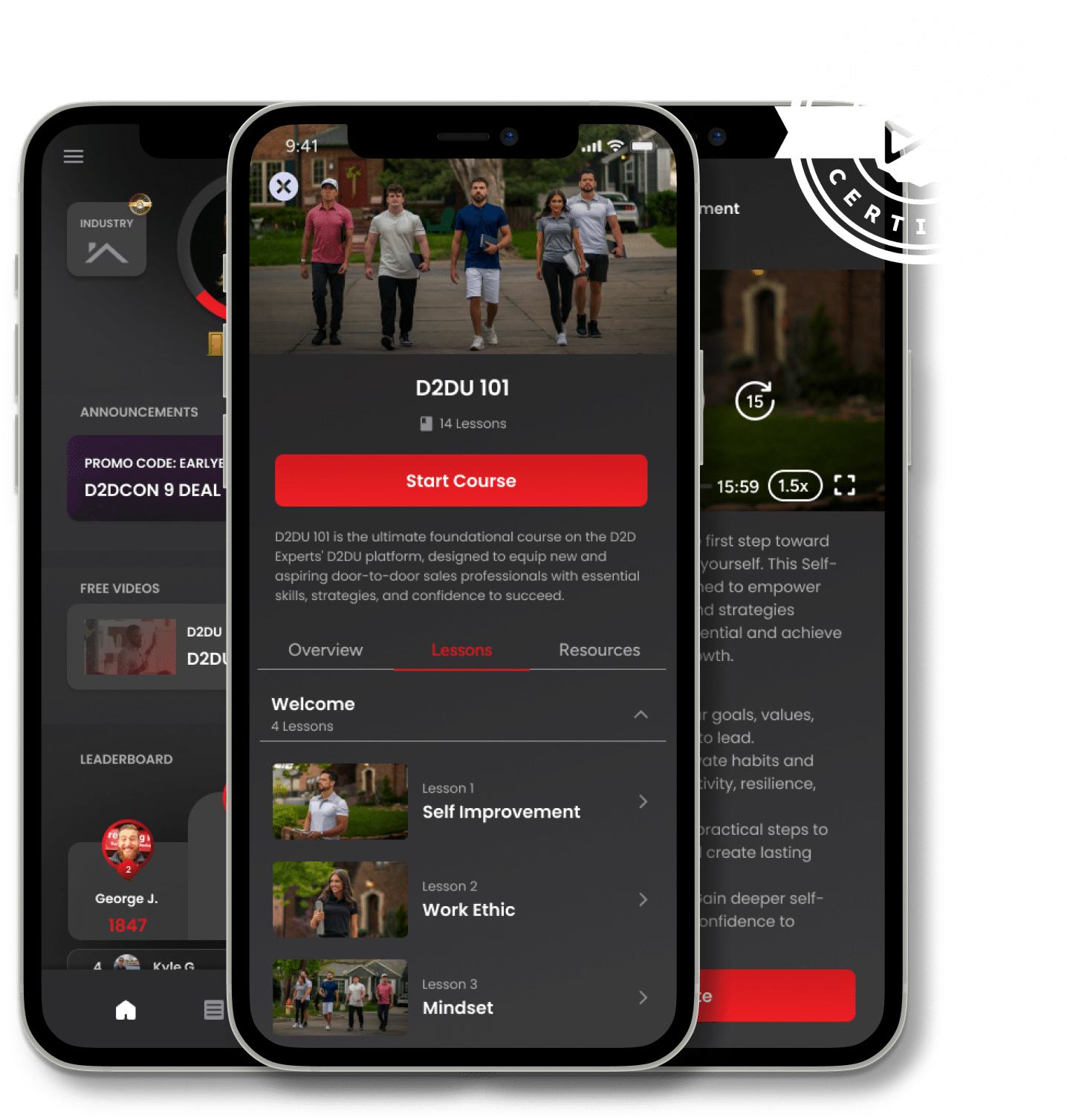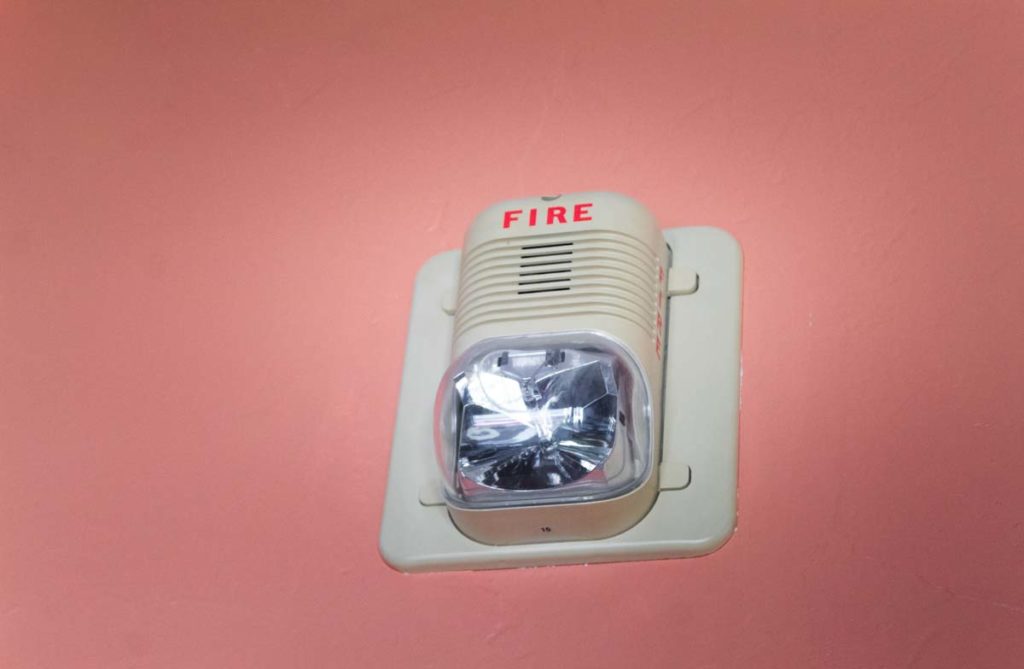🚨 Did you know that 75% of homeowners prioritize home security, yet only 17% have a security system?
That’s where you come in, door-to-door superheroes! Selling security systems door to door isn’t just a job; it’s a mission to bring peace of mind to every doorstep.
Convincing someone to switch providers or invest in a new security system isn’t easy. You’re stepping into the ring with time constraints, distractions, and the biggie: the trust factor. You’re not just selling a security product; you’re selling a promise of safety.
Your mission: To show your prospect why taking a few minutes out of their day could be the best decision they make for their family’s security.
So, you’re at the door, armed with charm and expertise, ready to negotiate a deal that could change someone’s life. Most folks might be okay with their current security system, but okay doesn’t always mean protected. Your challenge is to masterfully handle objections with the agility of a cat burglar (ironic, we know) and the persuasion of a politician.

Ready to turn those challenging 'nos' into successful 'yeses' in home security sales?
D2D University is one of the best sales training courses for beginners for alarm and security sellers.

The Typical Door to Door Alarm Sales Tip
The best course of action is to convince people that your security product is the right one. You must demonstrate more value than competitors, even if it is a more expensive security system. However, for all your hard work, you are probably familiar with the pattern of every “yes” preceded by five “no’s.” The solution is to pitch, listen, acknowledge objections, explore issues, and respond with more information and a close:
- Pitch your Product
- Listen
- Acknowledge Objections
- Explore Issues
- Respond
- Close
It is helpful to be aware that objections are part of the door to door security sales process and not to be dismayed. Not everyone will want what you offer. However, for building a solid sales platform, D2D Experts offers a complete solution for building and maintaining a reputable door-to-door sales company.
Common Objections While Selling Security Systems Door To Door

Your new security system could be the most revolutionary ever created. Unfortunately, objections are expected in door-to-door security sales. Door-to-door sales training and education platforms are excellent for tackling common sales issues.
However, some of the most common objections while selling security systems door to door include the following:
- Alarms and security are too expensive: This is probably the most common objection. Rather than discussing the cost, try to discuss the product’s real-world value.
- There’s nothing in the budget for alarms and security: this is also a common objection, especially from a business. You can help a willingness to buy by securing funds from senior staff or scheduling a follow-up.
- I have a contract with another alarms and security provider. Sometimes, prospects feel a little trapped by agreements. You can discuss the current relationship and arrange a switch-over discount.
- I can get alarms and security cheaper elsewhere. A potential customer usually feels they can get a more affordable product. Highlight the differences and the value of switching.
- I have too much going on to deal with something as trivial as alarms and security right now. People generally don’t have much time, but it could be a brush-off. So, instead, offer a follow-up meeting at their convenience to discuss the product.
- I’ve never heard of this alarms and security product before. This is a golden opportunity to provide detailed information about your product. Highlight the value in a purchase without pitching.
- I’ve had my system for a long time and am happy with it. This offers some technological insights via social media and review technology. Perhaps you could explain why older security systems are inadequate compared to smartphones and smart home-enabled devices.
Handling objections well allows potential customers to associate positivity with their interactions with you. This will establish your credibility and build trust. For example, suppose a prospect cannot buy from you that day. In that case, you should take the opportunity to schedule a follow-up appointment when they have the time, funds, or authorization to make a purchase.

How Do You Handle D2D Security Sales?
As an elite salesperson, leaving an objection unaddressed is a critical mistake. A vital action is to handle complaints as early as possible throughout your typical door-to-door alarm sale technique. A potential customer becomes much more challenging to convince if an already established negative opinion is reinforced. This will make your job infinitely more complex.
Always welcome objections as they occur and address them immediately. However, avoiding a defensive stance about a product or service is also beneficial. A defensive posture risks alienating a prospect and will only validate an existing negative perception. Instead, try to stay proactive when dealing with objections and tackle them head-on.
Objection handling is possible with the following methods:
1- Continuously Ask Questions
While explaining your alarms and security system, take the time to ask the potential client their opinions. For example, ask how they feel about the technology in their current service.
2- Listen to Statements and Gauge Perception
Try to be proactive in your listening to gauge the true sentiment about your product. Consciously take on everything a customer says about the product or why they cannot buy it.
3- Validate Customer Statements by Repeating
Further to listening, repeat the customer statements back to them. By doing this, you can form a picture of the obstacles preventing a purchase, such as outdated technology. You can use this to clarify their view of new and new systems such as smart home devices.
4- Try to Arrive at a Solution
Once obstacles are identified, you can find a solution that benefits both parties. For example, if money is the issue, explain the value of buying your product and offer alternative solutions such as credit if available.
5- Always Schedule a Follow-Up Appointment if Necessary
Sometimes, a potential client doesn’t have the time, money, or authorization to discuss a product such as alarms and security. In this case, always make an appointment to return or take personal details such as phone numbers or email addresses to arrange one.
Ready to turn those challenging 'nos' into successful 'yeses' in home security sales?
D2D University is one of the best sales training courses for beginners for alarm and security sellers.

In Summary
Learning a home security sales pitch and repeating it repeatedly is the easiest part of d2d security sales. Most of the time, it’s more akin to a script for door to door. But every potential client is different. For the most part, a customer is likely to be satisfied with their current D2D security system. Yet some will immediately switch if you are lucky. You can take the time to assess objections and explain some common hurdles, such as time, money, or a poor understanding of modern security technology. Using the d2d alarm sale techniques outlined will increase your chances of sales success.
Remember, every ‘no’ is a step closer to a ‘yes.’ You’re not just selling security systems door to door; you’re offering peace of mind, one door at a time. So gear up, bring your A-game, and let’s make every neighborhood a safer place!
Ready to turn those challenging ‘nos’ into successful ‘yeses’ in home security sales? D2D University is one of the best sales training courses for beginners for alarm and security sellers. Our extensive courses, crafted by top industry experts, focus on your challenges in selling alarm and security systems door to door.
In a Nutshell, the D2D University Offers:
- Specialized modules on overcoming common objections in selling security systems door to door
- Strategies to confidently convey the value of your security products.
- Door to door alarm sales tips to build trust and rapport with potential customers quickly.
- Interactive training sessions to hone your home security sales pitch.
- Access to a community of seasoned sales professionals for peer learning and support.

























